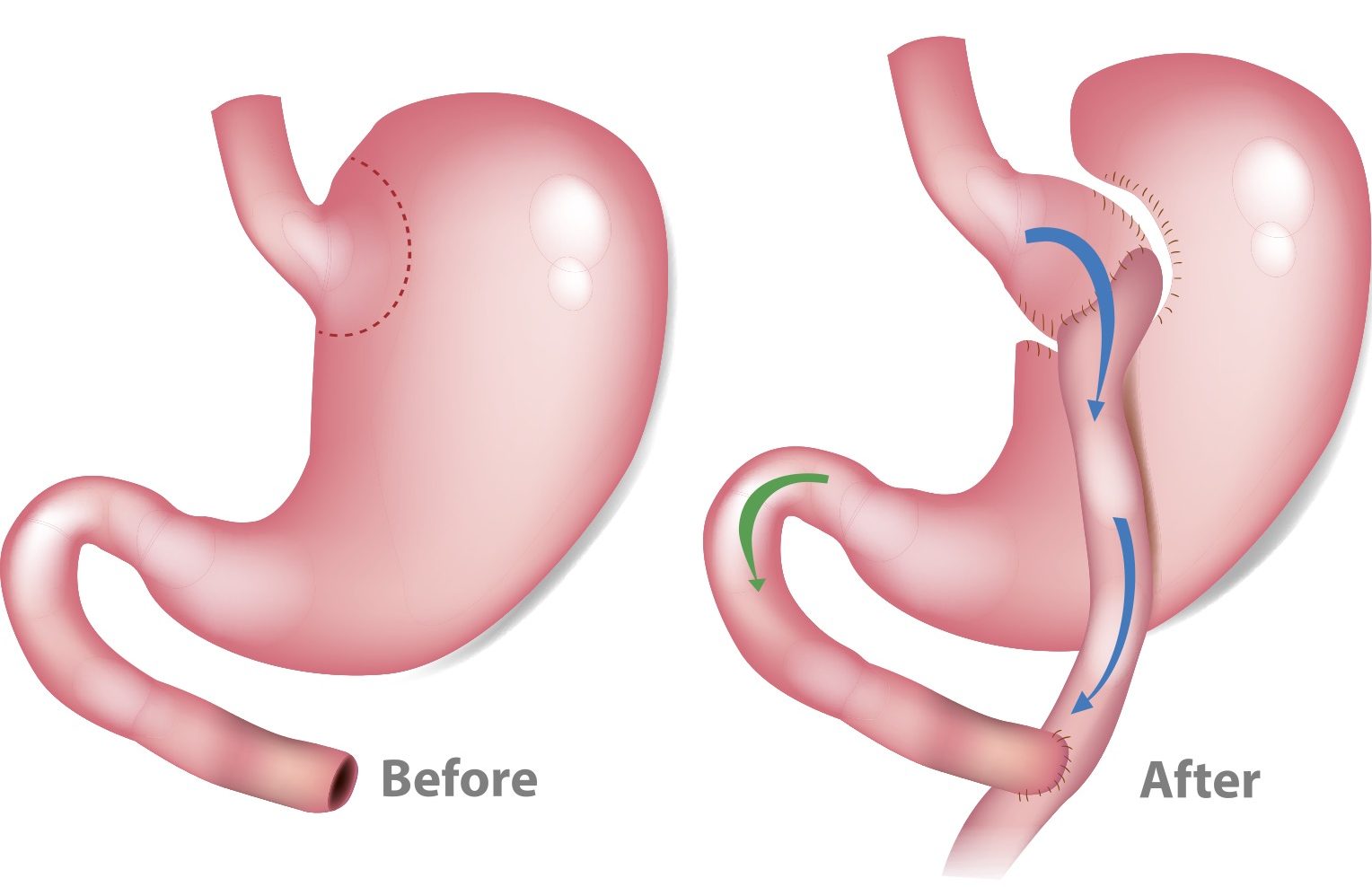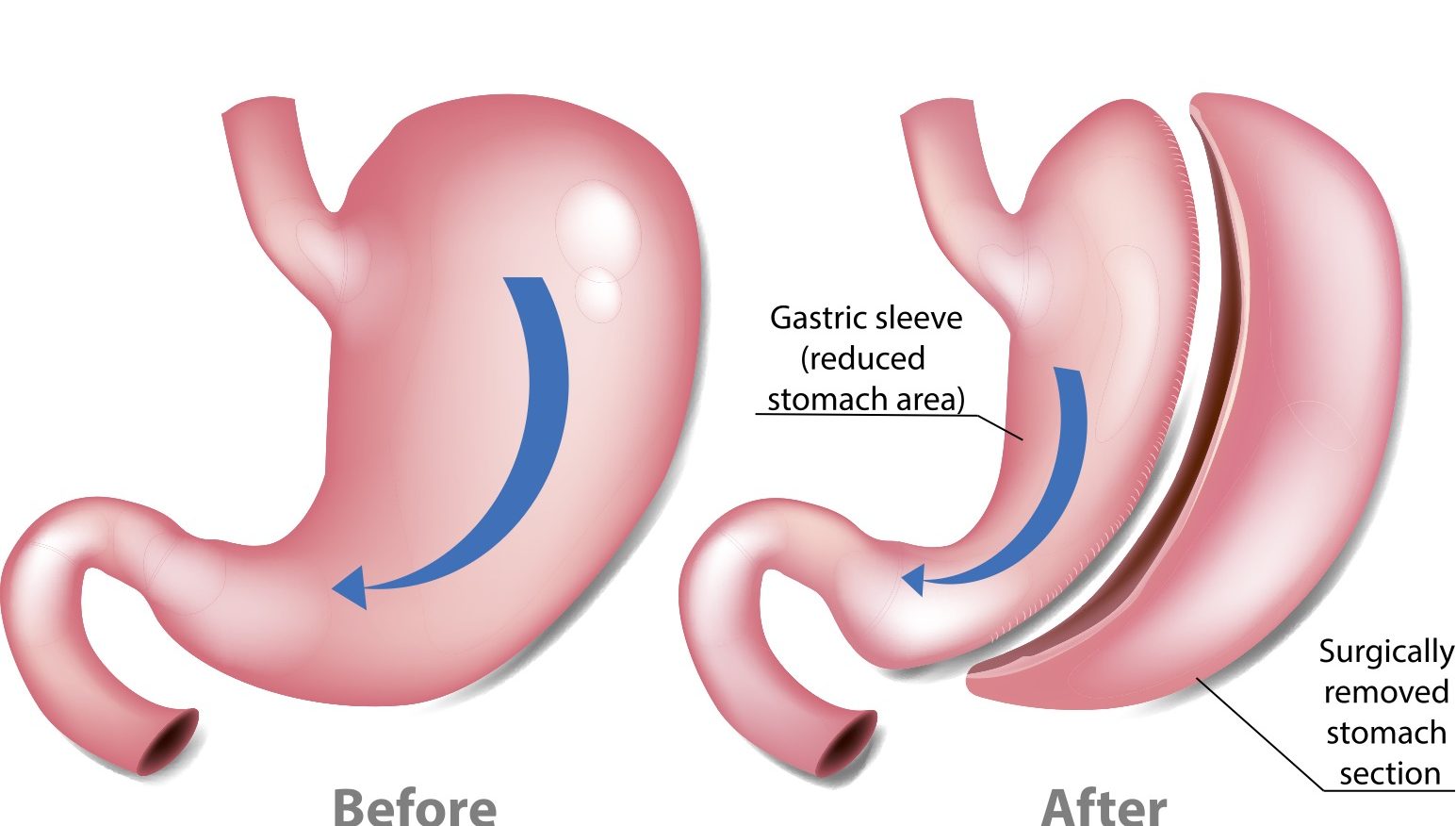Lose weight. Gain a Happier, Healthier YOU.
Let us help you take the steps toward overall health and an active lifestyle.
Our Program
Obesity is a disease that can be treated through medical interventions. Coryell Health Minimally Invasive Surgery Center offers bariatric surgery complemented by expert nutrition advice and behavioral health counseling to maximize results and long term success.
Unlike other weight loss programs, medical weight loss is directed by a physician. David Gochnour, MD, board certified general and bariatric surgeon, specializes in Obesity Medicine trained in managing weight related conditions. Working with experts from the fields of nutrition and psychiatry, a comprehensive medical weight loss program leads to better outcomes.
Gastric Bypass
Roux-en-Y gastric bypass is a bariatric procedure where your physician makes changes to your stomach and small intestine to change the way they absorb and digest food. A small pouch is created from the stomach and the small bowel is re-routed to the pouch, bypassing the first part of the intestines. This decreases the amount of food that can be consumed and slows down the absorption of nutrients. More importantly, it has been shown to have a positive effect on the various hormones that lead to obesity. Gastric bypass surgery is considered the ‘gold standard’ of weight loss surgery. It is the most commonly performed bariatric procedure worldwide.

Sleeve Gastrectomy
The Gastric Sleeve Surgery (or Vertical Sleeve Gastrectomy) is a bariatric procedure that removes 75-80% of the stomach, making it a tube like most of the digestive system. This also reduces the amount of food that can be consumed and shows positive effects on obesity hormones. It is now the most commonly performed bariatric procedure in United States and worldwide.
It’s Different from Gastric Bypass
In gastric bypass, the surgeon makes a small pouch that skips most of your stomach, going straight to the intestine.
Gastric sleeve surgery is best for people who have a BMI (body mass index) of at least 40. That means you’re 100 pounds or more over your ideal weight. Some people are too heavy for gastric bypass surgery, so it may be a good alternative.

Possible Benefits
- Cholesterol – a five point increase in HDL, or “good” cholesterol, lowering the risk of heart disease.
- Hypertension – a lowering of blood pressure, both systolic and diastolic, by about 5mmHg on average
- Diabetes – a decrease in A1C by about half a point, the same improvement as many anti-diabetic medications
- Insulin Resistance – significantly less insulin in the blood
- Obstructive Sleep Apnea – reduction in pauses and gaps in breathing during sleep, helping oxygenation
- Inflammation – fat cells, especially abdominal fat cells, produce a large number of substances that result in inflammation. Modest weight loss helps reduce this inflammation.
- Arthritis – help decrease pressure and inflammation of joints.
Talk to a Nurse
Contact Us
Bariatric Surgery-Gatesville / Coryell Health Medical Clinic
1507 West Main Street, Building 1
Gatesville, TX 76528
Phone: (254) 404-2555
Fax: (254) 248-0626
DaVinci Robot
The da Vinci Xi system lets our surgeons perform gastric bypass (also called Roux-en-Y) and sleeve gastrectomy bariatric procedures using minimally invasive techniques. Patients may have a shorter length of stay after surgery when their doctor uses the precise capabilities of the da Vinci system. Here’s how robotic-assisted surgery works:
- Your surgeon makes a few small incisions and uses a 3D high-definition camera for a clear, magnified view of the surgical area.
- Using the camera, the surgeon guides the tiny instruments to perform the procedure.
- Every hand movement of the surgeon is translated by the da Vinci system in real-time, bending and rotating the instruments so he or she can operate on the digestive system.
Meet the Doctor – David Gochnour, MD

David Gochnour, MD, Fellow of the American College of Surgeons, and American Society for Metabolic and Bariatric Surgery, is accepting new patients at Coryell Health Medical Clinic, Building 1.Dr. Gochnour has extensive experience in minimally invasive surgery, robotics and bariatric surgery.
BMI Calculator
Check your Body Mass Index to help determine the right weight loss solution for you!
Weight Loss Program
Coryell Health is committed to helping individuals improve their overall health and wellness by working with patients to overcome daily struggles with food choices. Our weight loss and lifestyle choices education protocol gives individuals struggling with weight management what they really need: a structured program that can put an end to constant dieting.
Ideal Protein Program
Coryell Health offers a comprehensive weight loss program including bariatric and metabolic surgery, Ideal Protein Weight Loss protocol, complemented by expert nutrition advice and behavioral health counseling to address obesity and it’s related medical problems. This comprehensive and individualized approach maximizes results and long term success.
Frequently Asked Questions
-
What types of bariatric services do you provide?
-Gastric bypass
-sleeve gastrectomy
-
What is gastric bypass surgery?
Gastric bypass is one of the most common types of weight loss surgery. The surgery alters the stomach, creating a small pouch that is connected directly to the small intestine. After surgery, food will bypass most of the stomach and the first section of the small intestine. A permanent change to diet is required to maintain weight loss and nutritional health. Because of the limited amount of capacity for food, patients will need to commit to eating healthfully and add nutritional supplements to their daily intake.
RISKS OF GASTRIC BYPASS SURGERY
Gastric bypass surgery has been proven to be successful in helping obese patients lose weight. Like all surgery, gastric bypass surgery involves risks such as malnutrition, stomal stenosis (the narrowing of the opening between the stomach and intestine) and “dumping syndrome” (where food gets dumped from the stomach into the small intestine without being digested). Peritonitis, or a stomach leak, is the most serious complication. Other risks include ulcers, hernias, blood clots and pulmonary embolism. Nutritional management, careful oversight of your health and quick reporting of issues to your doctor can help resolve these issues.
-
What is sleeve gastrectomy?
Sleeve gastrectomy is a weight loss surgery that removes 75-80% of the stomach. The procedure is done laparoscopically, through small incisions in the abdominal wall. The surgery divides the stomach, creating a smaller pouch with only 25% of the original volume. The reduction in stomach volume causes you to feel full faster and reduces the secretion of hunger hormones. On average, people lose 60-70% of their excess weight 12 to 24 months after surgery. As with any bariatric surgery, patients must adhere to a healthy diet and active living post-surgery.
RISKS OF SLEEVE GASTRECTOMY
As with any surgical procedure, complications can occur. Some possible complications include, but are not limited to: Infection, blood clots, pneumonia, bleeding ulcer, bleeding, leak, stricture (severe tightening of the sleeve) and worsening heartburn.
-
What is included in my personalized program?
- A medical evaluation by a physician
- Treatment of possible medical issues for your weight gain
- Laboratory blood tests
- Body composition analysis
- An EKG or bone density screening, if necessary
- Prescription weight loss medication, if necessary
- Nutritional counseling
- Mental Health therapy, if necessary.
-
What should I expect from this program?
- A personalized approach to setting weight loss goals based on individual health profiles
- A fundamental knowledge of nutrition and how your body gains and loses weight
- Easy to prepare, affordable, and delicious foods and recipes
- Lifestyle education, maintenance and guidance to help sustain your weight loss
- One-on-one wellness coaching, to motivate, educate, and hold you accountable every step of the way
- Join our Facebook group for online support with tips and recipes, videos, and more
-
Am I a Candidate for Medical Weight Loss?
Anyone with a body mass index (BMI) of 30 or over can benefit from a medical weight loss program. Body mass index measures your body fat relative to your height and weight.
-
What may disqualify me from bariatric surgery?
The following health conditions must be identified and successfully managed before surgery:
- Diabetes
- Hypothyroidism
- Severe or long-term (chronic) obstructive sleep apnea
- Heart or lung disease
- Depression, anxiety, substance abuse or other mental health conditions
- Digestive tract disease, such as Crohn’s disease, ulcers, or esophagitis
- Liver disease
- Chronic pancreatitis
- Issues with excessive bleeding
Disqualifications can also include:
- Being pregnant or planning to become pregnant within two years
- Using tobacco or marijuana, drinking alcohol, or using illegal drugs
- Using steroids over a long period of time or within the past 30 days
- Having a mental health condition that is not successfully managed
- Having a medical condition that makes surgery too risky
- Having a BMI greater than 60 for females and 55 for males
-
Why do I need to meet with a psychiatrist before surgery?
Many bariatric surgery candidates have mental health conditions, which can get in the way of making the significant, lifelong changes in eating and physical activity needed to support successful bariatric outcomes. A pre-surgical psychosocial assessment conducted by a psychiatrist is an opportunity to prepare bariatric candidates for surgery.
During this evaluation, your psychiatrist will
- help identify vulnerabilities (such as disordered eating behaviors like emotional eating),
- provide support and education regarding what to expect following surgery (such as a warning about increased risk for alcohol use disorders) and
- identify possible contraindications to surgery (such as active substance abuse or uncontrolled psychiatric illness).
This assessment helps build a treatment plan with each candidate to facilitate the best possible outcome.
-
What results can I expect from bariatric surgery?
Each procedure will have a different outcome. On average, people lose 50-80 percent of their excess body weight in the first year depending on the type of surgery performed and the level of commitment to the post-surgical diet and exercise regimen.
As with any surgical procedure, there are risks associated with bariatric surgery. You and your surgeon will discuss specific risks related to your individual health condition and your selected surgical procedure.
-
Does my insurance cover bariatric surgery?
-
Why would I regain weight after gastric bypass?
-
How long will I need to stay in the hospital?
-
What is the recovery time following surgery?
-
What type of side effects can I expect?
-
What is the success rate?
-
What is the recovery process?
-
Can bariatric surgery improve my health and expand my lifespan?
-
How much weight will I lose after surgery?
-
How long does it take after my initial consultation to get scheduled for surgery?
-
Will I have excess skin after weight loss surgery?
-
What should I expect at my initial consultation?
Featured Blogs
Coryell Health Adds Bariatric Surgeon to Existing Weight Loss Program
Obesity is a disease that can be treated through medical interventions, and Coryell Health is excited to welcome Dr. David Gochnour, weight loss and bariatric surgeon, to the team. Scientific...
Minimally Invasive Surgery
At its very core, performing a successful surgical procedure is about art, skill, and precision, all of which can be supported and advanced by the latest technologies. At Coryell Health...
Take the first step toward a happier, healthier you!
If you’re overweight or obese – you’re not alone. In fact, the National Health and Nutrition Examination Survey reports that more than two in three adults are considered to be...
The Sugary Soda Shake Down
This tweet went viral in May 2019. A few years ago, this tweet went viral and people freaked out. Does one bottle of Coke really contain the same amount of...
General & Bariatric Surgery Clinics Move to Building 1
General and Bariatric Surgery clinics will now be located in Coryell Health Medical Clinic, Building 1. Dr. John Bawduniak, general and vascular surgeon, and Dr. David Gochnour, bariatric and general...
Is Bariatric Surgery In A Foreign Country Worth The Cost?
Traveling south of the border has its perks. Sunny beaches, delicious food, and rich cultural history make Mexico a desirable vacation spot. But, when it comes to a life-changing surgery,...
Are You a Part of the 10%?
Nearly one in 10 Americans are living with diabetes. Are you one of them? If diabetes is controlling your life, it may be time to consider bariatric surgery to reduce...
Eat This, Not That
Embrace a New You This New Year More than 36% of American adults eat fast food in a day. While it may be the quick, convenient and sometimes the only...
The Link Between Obesity and Chronic Pain
Could Diet and Exercise Be The Solution? What’s an everyday activity that brings you joy? Is it playing with your kids? Walking your dog? Having a dance party while loading...
Top 10 Reasons to Choose Coryell Bariatric Medicine
The Key to Your Weight Loss Success Losing weight can be a daunting task, but with Coryell Bariatric Medicine, it doesn’t have to be. Our bariatric surgery program, led by...
Bariatric Surgery Q&A with Dr. David Gochnour
Surgical Weight Loss Advice from an Expert Are you struggling in your weight loss journey? Not enjoying your once-favorite activities due to a lack of energy? Not sleeping well? Bariatric...
3 Proven Weight Loss Solutions for 2025
Your Path to Sustainable Weight Loss Starts Here Are you struggling in your weight loss journey? Not enjoying your once-favorite activities due to a lack of energy? Not sleeping well?...
 Skip to content
Skip to content

